2023届中考英语语法专项复习之:一般将来时课件(共16张PPT)
文档属性
| 名称 | 2023届中考英语语法专项复习之:一般将来时课件(共16张PPT) |  | |
| 格式 | ppt | ||
| 文件大小 | 296.5KB | ||
| 资源类型 | 教案 | ||
| 版本资源 | 通用版 | ||
| 科目 | 英语 | ||
| 更新时间 | 2022-09-12 20:18:42 | ||
图片预览

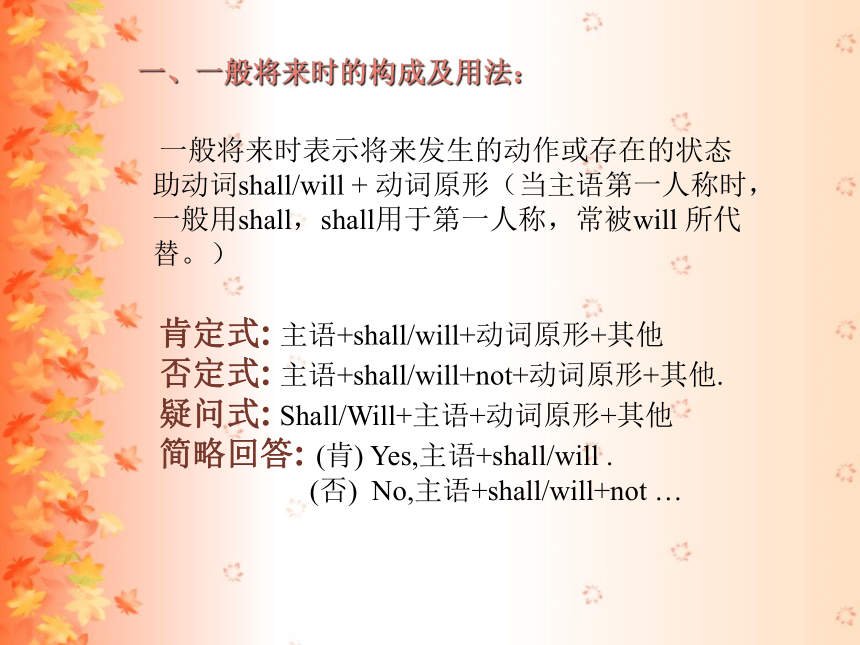
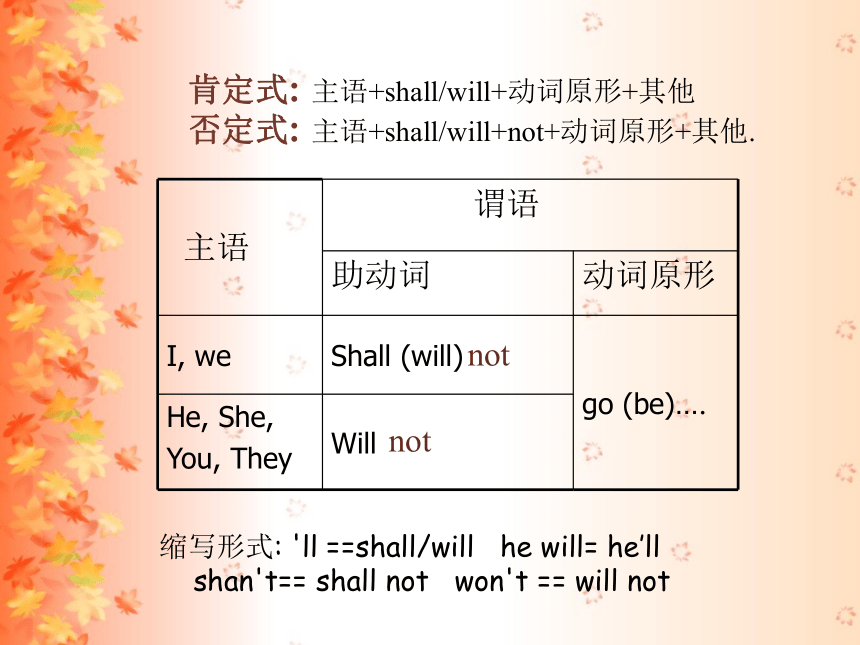
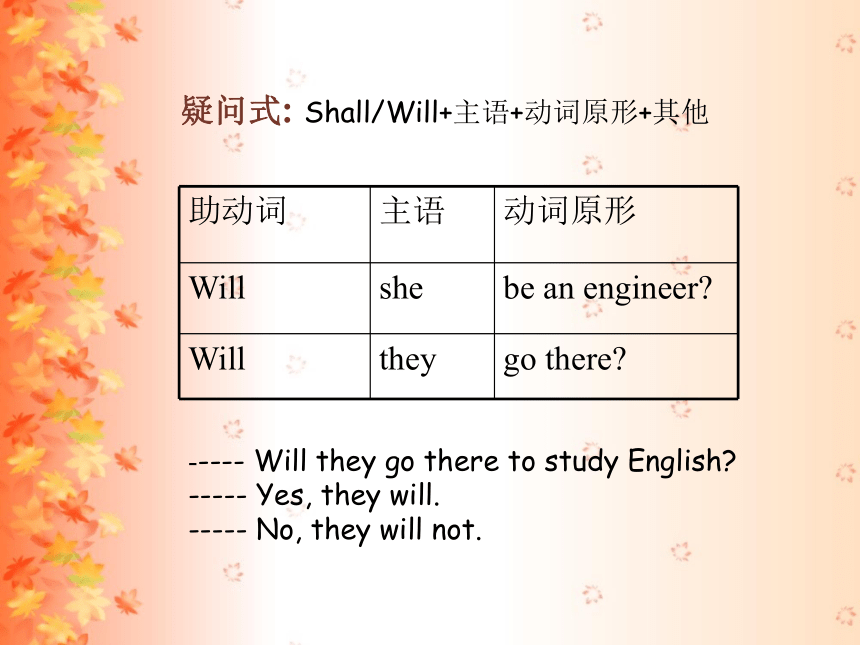
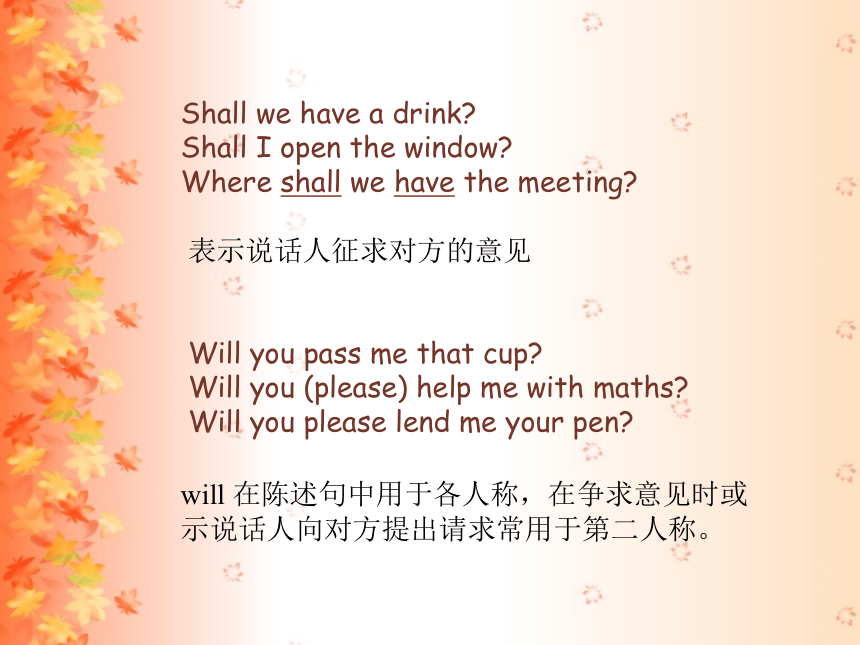
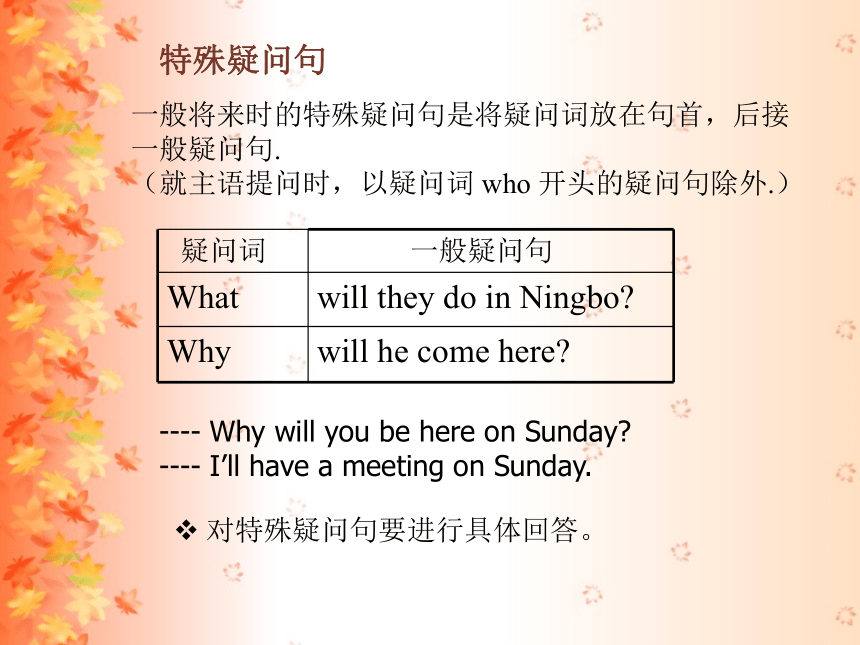
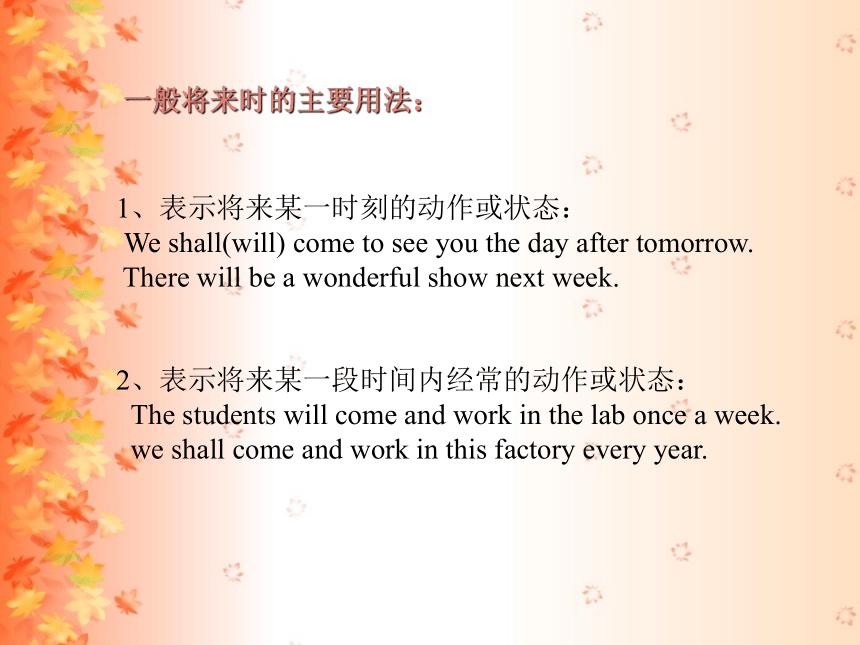
文档简介
(共16张PPT)
一、一般将来时的构成及用法:
一般将来时表示将来发生的动作或存在的状态
助动词shall/will + 动词原形(当主语第一人称时,一般用shall,shall用于第一人称,常被will 所代替。)
肯定式: 主语+shall/will+动词原形+其他 否定式: 主语+shall/will+not+动词原形+其他.
疑问式: Shall/Will+主语+动词原形+其他
简略回答: (肯) Yes,主语+shall/will .
(否) No,主语+shall/will+not …
肯定式: 主语+shall/will+动词原形+其他
否定式: 主语+shall/will+not+动词原形+其他.
主语 谓语
助动词 动词原形
I, we Shall (will) go (be)….
He, She,
You, They Will
not
not
缩写形式: 'll ==shall/will he will= he’ll
shan't== shall not won't == will not
疑问式: Shall/Will+主语+动词原形+其他
助动词 主语 动词原形
Will she be an engineer
Will they go there
----- Will they go there to study English
----- Yes, they will.
----- No, they will not.
表示说话人征求对方的意见
Will you pass me that cup
Will you (please) help me with maths
Will you please lend me your pen
Shall we have a drink
Shall I open the window
Where shall we have the meeting
will 在陈述句中用于各人称,在争求意见时或示说话人向对方提出请求常用于第二人称。
特殊疑问句
一般将来时的特殊疑问句是将疑问词放在句首,后接一般疑问句.
(就主语提问时,以疑问词 who 开头的疑问句除外.)
疑问词 一般疑问句
What will they do in Ningbo
Why will he come here
---- Why will you be here on Sunday
---- I’ll have a meeting on Sunday.
对特殊疑问句要进行具体回答。
一般将来时的主要用法:
1、表示将来某一时刻的动作或状态:
We shall(will) come to see you the day after tomorrow.
There will be a wonderful show next week.
2、表示将来某一段时间内经常的动作或状态:
The students will come and work in the lab once a week.
we shall come and work in this factory every year.
二、will(shall)+ 动词原形与 to be going to + 动词原形两种句型表示将来的区别
两者有时可以通用, 但两者有时有区别:
----What are you going to do this evening
----I’m going to see a film.
You will be forty years old next year.
Tomorrow will be Sunday again.
只是单纯地预测未来的事,此时可与will互换。例如:
I think it is going to/will rain this evening. 我认为今晚要下雨。
1.当表示主观方面“打算,准备” 去做什么事情的时候,往往用be going to +动词原形,而will 则多用来表示纯属客观的将来:
2. be going to+动词原形可表示事先计划的意图,而 will
则表示说话人当时决定的意图;
He is studying hard and is going to try for the exams. 他正努力学习,准备参加考试。(不能用will替换)
—Can somebody help me ——谁能帮我一下吗? —I will. ——我来。(不能用be going to替换)
We're going to drive you home after the meeting.
Don't call a taxi. We'll drive you home.
I feel ill now, and I'll go to see the doctor.
I'm going to see the doctor this evening.
表示即将要发生的动作.
Hurry up! We're about to leave.
The football match is about to begin in a few minutes.
三、be about to 结构表示将来
四、Revision of all forms with future meaning
(一). shall/will+动词原形
1.will可用于所有人称,但shall 仅表示单纯将来时,
用于第一人称I和we,作为will的一种替代形式。
2. will , shall可用来预言将来发生的事。如说出我们设想会发生的事,或者请对方预言将要发生什么事。例如: It will rain tomorrow. 明天将要下雨。
2. 表示主语现在的意图或现已作出的决定,即打算在最近或将来进行某事。例如: He isn’t going to see his elder brother tomorrow. 他明天不准备去看他哥哥。
(二). be going to+动词原形
1. 表示说话人根据现在已有的迹象,判断将要或即将发生某种情况。这类句子的主语可以是人,也可是物。例如: There is going to be a football match in our school tomorrow afternoon. 明天下午我们学校将有一场足球赛。(已有告示)
用所给动词的正确形式填空
1.I (do) my homework tonight.
2.We (water) the flowers this afternoon.
3.He (buy) a CD next Saturday.
4.You (read) books on the weekend.
5.They (go) the cinema this evening.
6.My parents (fly) to Beijing tomorrow.
am going to do
are going to water
is going to buy
are going to read
are going to
are going to fly
The end
Thank you
一、一般将来时的构成及用法:
一般将来时表示将来发生的动作或存在的状态
助动词shall/will + 动词原形(当主语第一人称时,一般用shall,shall用于第一人称,常被will 所代替。)
肯定式: 主语+shall/will+动词原形+其他 否定式: 主语+shall/will+not+动词原形+其他.
疑问式: Shall/Will+主语+动词原形+其他
简略回答: (肯) Yes,主语+shall/will .
(否) No,主语+shall/will+not …
肯定式: 主语+shall/will+动词原形+其他
否定式: 主语+shall/will+not+动词原形+其他.
主语 谓语
助动词 动词原形
I, we Shall (will) go (be)….
He, She,
You, They Will
not
not
缩写形式: 'll ==shall/will he will= he’ll
shan't== shall not won't == will not
疑问式: Shall/Will+主语+动词原形+其他
助动词 主语 动词原形
Will she be an engineer
Will they go there
----- Will they go there to study English
----- Yes, they will.
----- No, they will not.
表示说话人征求对方的意见
Will you pass me that cup
Will you (please) help me with maths
Will you please lend me your pen
Shall we have a drink
Shall I open the window
Where shall we have the meeting
will 在陈述句中用于各人称,在争求意见时或示说话人向对方提出请求常用于第二人称。
特殊疑问句
一般将来时的特殊疑问句是将疑问词放在句首,后接一般疑问句.
(就主语提问时,以疑问词 who 开头的疑问句除外.)
疑问词 一般疑问句
What will they do in Ningbo
Why will he come here
---- Why will you be here on Sunday
---- I’ll have a meeting on Sunday.
对特殊疑问句要进行具体回答。
一般将来时的主要用法:
1、表示将来某一时刻的动作或状态:
We shall(will) come to see you the day after tomorrow.
There will be a wonderful show next week.
2、表示将来某一段时间内经常的动作或状态:
The students will come and work in the lab once a week.
we shall come and work in this factory every year.
二、will(shall)+ 动词原形与 to be going to + 动词原形两种句型表示将来的区别
两者有时可以通用, 但两者有时有区别:
----What are you going to do this evening
----I’m going to see a film.
You will be forty years old next year.
Tomorrow will be Sunday again.
只是单纯地预测未来的事,此时可与will互换。例如:
I think it is going to/will rain this evening. 我认为今晚要下雨。
1.当表示主观方面“打算,准备” 去做什么事情的时候,往往用be going to +动词原形,而will 则多用来表示纯属客观的将来:
2. be going to+动词原形可表示事先计划的意图,而 will
则表示说话人当时决定的意图;
He is studying hard and is going to try for the exams. 他正努力学习,准备参加考试。(不能用will替换)
—Can somebody help me ——谁能帮我一下吗? —I will. ——我来。(不能用be going to替换)
We're going to drive you home after the meeting.
Don't call a taxi. We'll drive you home.
I feel ill now, and I'll go to see the doctor.
I'm going to see the doctor this evening.
表示即将要发生的动作.
Hurry up! We're about to leave.
The football match is about to begin in a few minutes.
三、be about to 结构表示将来
四、Revision of all forms with future meaning
(一). shall/will+动词原形
1.will可用于所有人称,但shall 仅表示单纯将来时,
用于第一人称I和we,作为will的一种替代形式。
2. will , shall可用来预言将来发生的事。如说出我们设想会发生的事,或者请对方预言将要发生什么事。例如: It will rain tomorrow. 明天将要下雨。
2. 表示主语现在的意图或现已作出的决定,即打算在最近或将来进行某事。例如: He isn’t going to see his elder brother tomorrow. 他明天不准备去看他哥哥。
(二). be going to+动词原形
1. 表示说话人根据现在已有的迹象,判断将要或即将发生某种情况。这类句子的主语可以是人,也可是物。例如: There is going to be a football match in our school tomorrow afternoon. 明天下午我们学校将有一场足球赛。(已有告示)
用所给动词的正确形式填空
1.I (do) my homework tonight.
2.We (water) the flowers this afternoon.
3.He (buy) a CD next Saturday.
4.You (read) books on the weekend.
5.They (go) the cinema this evening.
6.My parents (fly) to Beijing tomorrow.
am going to do
are going to water
is going to buy
are going to read
are going to
are going to fly
The end
Thank you
同课章节目录
- 词法
- 名词
- 动词和动词短语
- 动词语态
- 动词时态
- 助动词和情态动词
- 非谓语动词
- 冠词
- 代词
- 数词和量词
- 形容词副词及其比较等级
- 介词和介词短语
- 连词和感叹词
- 构词法
- 相似、相近词比较
- 句法
- 陈述句
- 一般疑问句和否定疑问句
- 特殊疑问句及选择疑问句
- 反意疑问句
- 存在句(There be句型)
- 宾语从句
- 定语从句
- 状语从句
- 主谓一致问题
- 简单句
- 并列句
- 复合句
- 主谓一致
- 主、表语从句
- 名词性从句
- 直接引语和间接引语
- 虚拟语气
- 感叹句
- 强调句
- 倒装句
- 祈使句
- 句子的成分
- 句子的分类
- 题型专区
- 单项选择部分
- 易错题
- 完形填空
- 阅读理解
- 词汇练习
- 听说训练
- 句型转换
- 补全对话
- 短文改错
- 翻译
- 书面表达
- 任务型阅读
- 语法填空
- 其他资料
